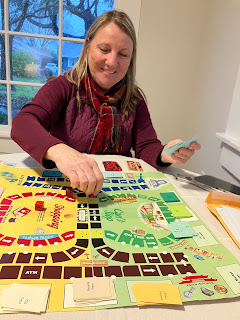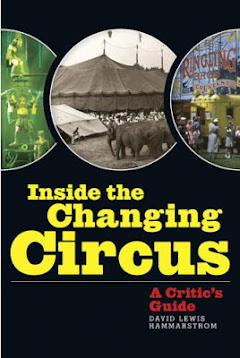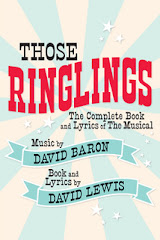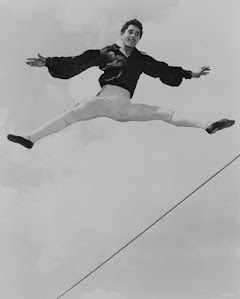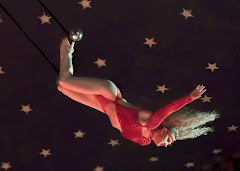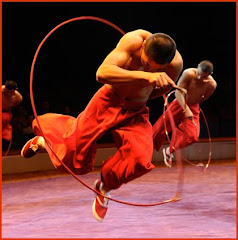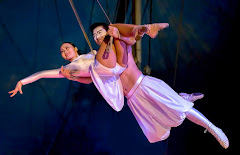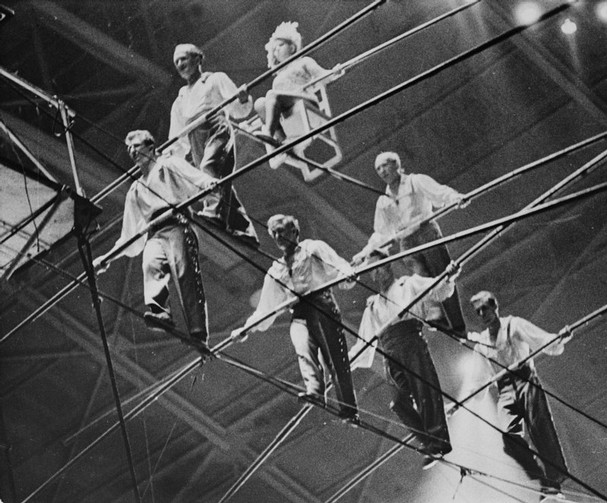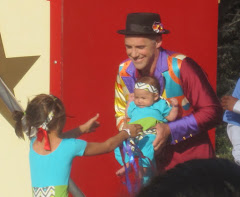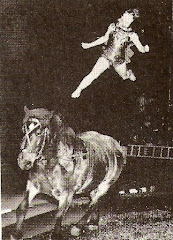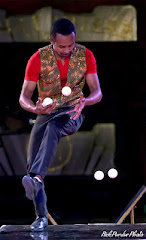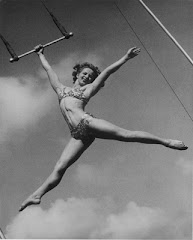In my reading hands at the moment is an old fashioned hard copy, from my local library, of E. L. Doctorow's masterfully wrought The Waterworks. Before that, I'd reconnected, not reading her since childhood, with Mary Roberts Rinehart, being held in thrall by her nifty tale, The Bat. I'd fled to Rinehart for a guaranteed good read after giving up, at page 184, on one of my favorite authors, Henry James — how could so great a pen turn out so tediously trying a work as The Ambassadors?
Why do I resist the iPad, when sometimes I admire it from afar in the hands of others in cafes, on buses? Up close, as I again found it to be a few days ago at Best Buy (wanting, really wanting, to get myself an electronic toy — okay, to impress somebody, too), the latest iPad, as those before it, looks to me like a cross between a high tech lab measuring device – and a piece of fine crystalline jewelry.
A real book is so individual, so historical in the wear of its pages, some fresh and new, others worn with creases at the top edges were previous readers stopped for a break. And I will add a few more creases as well. Each book, all together as varied as a crowd of people, bears a unique look in cover design art, in the layout of words across the pages, the chapter headers, the font style.
And perhaps, best of all, a book forces me to settle into a relationship with one object. I do not relish sharing my reads with a million other apps lurking under the screen, with the purr of the device teasing me to check my e-mail or do a quick search for something buzzing about in the corner of my distracted mind. The personal concentration of holding a book in my hand is lost.
A few weeks ago, I decided that every day around noon, after spending the morning on writing projects, I would shut down my PC, and what a relief. I am forced, in lieu of being drawn stupidly and addictively back and back to my computer, to consider other non-PC projects, like reading old fashioned books. Like cleaning up the clutter. Like laboring over my model roller coaster to see if somehow, someday, I can make it never never ever derail again. Around five, my computer is allowed back into my life.
I am starting to look forward to my new electronic-free afternoons.
Sunday, March 25, 2012
Friday, March 23, 2012
Smart Changes Promise Fresh Excitement: Carson & Barnes Has New Website & Marketing; Circus Vargas Has Kevin Venardos
 More than ever before, circuses need to change from year to year, need to shake things up and convince their customers they are not "same old same old."
More than ever before, circuses need to change from year to year, need to shake things up and convince their customers they are not "same old same old."Surfing the web this morning, I was pleased to see evidence of fresh thinking on two of our mainstay tent shows.
The new logo for Carson & Barnes, above, does not exactly reflect the show's winning new bannery website , full of color, grace, warm advertising prose. With it comes a sidebar blog, Everything Circus, which offers impressive historical big top bytes. Those redoubtable Byrds -- gotta love their trouping spirit -- have hired the Acree Creative firm to design a new marketing strategy. If the breezy website look can be extended into the performance itself (C&B over the winter were looking for a new performance director), that might result in overflow half houses -- and in today's market (even on RBBB), half houses are the new gold standard, right? Fly, Byrds, fly!
 Circus Vargas has a new theme -- With a Touch of Broadway -- and just the right new ringmaster to work the theme in Kevin Venardos, a matriculating pro from Ringling via the Big Apple Circus, where his participation was curiously wordless. I'd like to see more of his work.
Circus Vargas has a new theme -- With a Touch of Broadway -- and just the right new ringmaster to work the theme in Kevin Venardos, a matriculating pro from Ringling via the Big Apple Circus, where his participation was curiously wordless. I'd like to see more of his work.I'm looking forward to seeing how different the show might look and sound. Same as for Carson & Barnes. Heck! I just resolved last winter to stay way from same old same olds. And now, am I really facing more miles to walk after more dreary bus rides to take?
Let go of me, world of circus!
Tuesday, March 20, 2012
I Bring You Those Ringlings ... They're Back!

Seen in the above photo, sent to me by Shirley Ringling North, are, from left, Bob Carroll, John Ringling North II, his wife, Shirley, John Ringling North III, Katherine North (now Carroll), Sorcha North, and Mark Byrne. They represent the John Ringling branch of the family.
Shirley promises me more photos, presumably one including Charles Ringling, who, by representing the Charles Ringling branch, effectively re-joins two once fractious lines.
August Ringling and Salome Ringling, parents of the original seven brothers, should be smiling down from up there on the Big Lot.
Gaze at the strong steady face of the man in the middle. I see the granite will I felt when I interviewed John Ringling North. I see a long future ahead for the restored House of Ringling.
Wednesday, March 14, 2012
Hello Again, House of Ringling!
Taking a break away from you know what (OK, it continues to sell well up there north of the border) , once again I have been egged on by a number of items to revisit the subject of subjects. Blame it on kid clown blogger Steve Copeland. On Sir James Royal, now of Hugo (perhaps nursing PTMS – Post Traumatic Mud Syndrome), who has a way of teasing me with references to touring in adversity. Okay, Jim, you asked for it ...
Without a decent press agent to tout its quirky ways (Jack Ryan, a little pro bono from your pen?), Kelly Miller Circus, now an arm of the self-restoring House of Ringling, manages to tickle and infuriate me with its peculiar very un-Ringling like penchant for operating without adequate flackery.
Latest un-publicized giggle where today’s resurgent Ringling descendants hold merry court (you can thank unofficial KM press agent Steve Copeland for the scoop) must be the reincarnation of Louse Ringling (Louise, the wife of Albert, charmed snakes, rode horses, et all) — in the form of fill-in clown, Shirley Ringling North, wife of John II. Shirley I had such a “blast” filling in on the skeleton chase for Steve Copeland while he was away tending to his brother's legit wedding, that she-Shirley, per he-Steven, was “a little disappointed” that he made it back so soon, only one day later, and in time for the first show. Seems Ms. Shirley is sawdust smitten.
Now, to Shirley’s husband John II. He owns the party, in case you didn’t know. [is anybody out there not a Ringlingphile?] They will tell you he watches every show like a hawk (hnmmm, a circus critic in the making? Pity him.). That is, when he himself is not performing in it. He now and then cameos in the ring, spinning cowboy ropes, pasturing with tigers, beating drums for the band. What next, the peanut pitch?
Indeed, Mr John the Second has joked to me (or was he serious?) about cracking nuts together in missives dated Ireland, and so, who knows ... He is very much a Ringling original, as were all the originals.
Perhaps John and Shirley are now designing clown props for themselves. Keep in mind, the founding five worked backwoods Wisconsin vaudeville circuits, all of ‘em, before setting up under a tent in 1884. Are you getting my Great Legacy drift here?
North II is spending more time each year traveling with the show. Which evidently makes it less imperative for James Royal, official show manger, to travel too. Which relieves him (is that the incorrect word?) to hang out more in Hugo, I suppose working the front end from a telephone. Or maybe in secret honing his inner hula hoop urges, just in case ...
The Royal of Royals tells me he makes the first two weeks in Texas (how heroic), where, I say, mud is king. So I guess he is a glutton for brown goo, following which, perhaps dreading the comparative boredom of sunshine and blue Irving Berlin skies, Jim hits the road back to Hugo.. He does, periodically, visit the lot to “check on things.” This has been his way the last two seasons.
He once liked to call himself North II’s “Art Concello.” Now, can you picture Art sitting at desk all day long? But since North II is acting not at all like North I (the playboy producer who rarely ever visited the show), perhaps Concello II feels a need to mellow out and smell the Oklahoma weeds.
But I’m not buying. Says I, Royal needs to get back on the lot. And I’ll tell you why. Recently, a Huge Historical Ringling Family Photo Op was recklessly missed, and for that I say, shame on those frolicking Ringlings! One of them needs to get OUT of costume, get a CAMERA and try being Alf T. Ringling, the brainy brother who turned himself into one of the best press agents in circus history.
The photo op that drives this post: In attendance at a recent show, all of them out of makeup and evidently controlling their thespianic urges in the seats, were John Ringling North II and wife Shirley I, John Ringling North III and his wife, AND Charles Ringling with spouse. Charles is the son of Robert, grandson of the original Charles Ringling (sweetest of all the brothers). This, relayed to me by Royal, whom you can blame for this edgy post.
And where, may I ask, was there a soul with a camera and a sense of exploitable Ringling history while all of this was taking place?
I asked Jim for a photo, he pledged to look for one. Came his shocking reply: “Sorry, so far no luck in locating a photo. Damn it!”
Does nobody on the show own a digital? Even I own a digital!
Jim Royal did assure me, had he been there he would have snapped away.
I say it’s time for Art Concello to get back on the lot. Those giddy circus-struck Ringlings need an adult to monitor, with camera in hand, their giddy reimmersion into the world of sawdust and spangles.
Without a decent press agent to tout its quirky ways (Jack Ryan, a little pro bono from your pen?), Kelly Miller Circus, now an arm of the self-restoring House of Ringling, manages to tickle and infuriate me with its peculiar very un-Ringling like penchant for operating without adequate flackery.
Latest un-publicized giggle where today’s resurgent Ringling descendants hold merry court (you can thank unofficial KM press agent Steve Copeland for the scoop) must be the reincarnation of Louse Ringling (Louise, the wife of Albert, charmed snakes, rode horses, et all) — in the form of fill-in clown, Shirley Ringling North, wife of John II. Shirley I had such a “blast” filling in on the skeleton chase for Steve Copeland while he was away tending to his brother's legit wedding, that she-Shirley, per he-Steven, was “a little disappointed” that he made it back so soon, only one day later, and in time for the first show. Seems Ms. Shirley is sawdust smitten.
Now, to Shirley’s husband John II. He owns the party, in case you didn’t know. [is anybody out there not a Ringlingphile?] They will tell you he watches every show like a hawk (hnmmm, a circus critic in the making? Pity him.). That is, when he himself is not performing in it. He now and then cameos in the ring, spinning cowboy ropes, pasturing with tigers, beating drums for the band. What next, the peanut pitch?
Indeed, Mr John the Second has joked to me (or was he serious?) about cracking nuts together in missives dated Ireland, and so, who knows ... He is very much a Ringling original, as were all the originals.
Perhaps John and Shirley are now designing clown props for themselves. Keep in mind, the founding five worked backwoods Wisconsin vaudeville circuits, all of ‘em, before setting up under a tent in 1884. Are you getting my Great Legacy drift here?
North II is spending more time each year traveling with the show. Which evidently makes it less imperative for James Royal, official show manger, to travel too. Which relieves him (is that the incorrect word?) to hang out more in Hugo, I suppose working the front end from a telephone. Or maybe in secret honing his inner hula hoop urges, just in case ...
The Royal of Royals tells me he makes the first two weeks in Texas (how heroic), where, I say, mud is king. So I guess he is a glutton for brown goo, following which, perhaps dreading the comparative boredom of sunshine and blue Irving Berlin skies, Jim hits the road back to Hugo.. He does, periodically, visit the lot to “check on things.” This has been his way the last two seasons.
He once liked to call himself North II’s “Art Concello.” Now, can you picture Art sitting at desk all day long? But since North II is acting not at all like North I (the playboy producer who rarely ever visited the show), perhaps Concello II feels a need to mellow out and smell the Oklahoma weeds.
But I’m not buying. Says I, Royal needs to get back on the lot. And I’ll tell you why. Recently, a Huge Historical Ringling Family Photo Op was recklessly missed, and for that I say, shame on those frolicking Ringlings! One of them needs to get OUT of costume, get a CAMERA and try being Alf T. Ringling, the brainy brother who turned himself into one of the best press agents in circus history.
The photo op that drives this post: In attendance at a recent show, all of them out of makeup and evidently controlling their thespianic urges in the seats, were John Ringling North II and wife Shirley I, John Ringling North III and his wife, AND Charles Ringling with spouse. Charles is the son of Robert, grandson of the original Charles Ringling (sweetest of all the brothers). This, relayed to me by Royal, whom you can blame for this edgy post.
And where, may I ask, was there a soul with a camera and a sense of exploitable Ringling history while all of this was taking place?
I asked Jim for a photo, he pledged to look for one. Came his shocking reply: “Sorry, so far no luck in locating a photo. Damn it!”
Does nobody on the show own a digital? Even I own a digital!
Jim Royal did assure me, had he been there he would have snapped away.
I say it’s time for Art Concello to get back on the lot. Those giddy circus-struck Ringlings need an adult to monitor, with camera in hand, their giddy reimmersion into the world of sawdust and spangles.
Saturday, March 10, 2012
Moneyball: The Beautiful Pain of Baseball Nearing an Early Autumn End

I watched the film Moneyball tonight, and it held me in thrall for the entire nine innings. Some of its wonderful pull is personal: I was once an A's Fan. Living in Oakland, how could I not have been?
I remember the World Series games in the early 1970s, oh, was baseball as beautiful as ballet, as strong as a horse race in slow motion. Such fleet perfection -- Catfish Hunter. Vida Blue. Sal Bando. Ray Fosse, and all the others. Games of effortless glory under a setting sun in the cool autumn skies when the Oakland A's could do no wrong. They owned the world. From a very high seat in the Oakland stadium, courtesy of my employer, I witnessed the glory of championship baseball. My team ruled. My team showed all the other teams how.
A's owner Charlie Finley, a cranky crazy character who turned on baseball after it had turned on him with its gargantuan salaries that favored fat-cat teams in New York and Boston, Chicago and L.A., sold his players off, one by one, and drove the franchise into the ground. But Finely had built a glorious dynasty that took the series three years in a row.
Enter, years later, Billy Bean. I did not know until watching the movie tonight that he had longed to be a baseball player, was, in fact, declared by scouts to have a great future. He had it all, they said. But, like so many promising young players, everything he had did not hold together when he was signed by the Mets. "Many are called, few are chosen," it is said in Moneyball. I had not known about this early life of Billy Bean. The film does a fine job of showing how his failed seasons with the Met would haunt him for the rest of his life. How sad that, for all the publicity and fame surrounding his brand of statistical-based baseball, he has yet to take a team to the World series.
When he entered the Oakland scene, I was a fan; in fact, for the first time in my life, an actual fan who listened to virtually all the games broadcast on the radio, announced by the great late Bill King ("Holy Toledo!"), whilst working on my scale model amusement park. Those games could fill an evening.
I listened to most or all of those record-breaking 20 games in a row that they won, What a thrill.
Out to the Oakland Coliseum I would go a few times a season. Garlic fries and the A's on a sunny summer afternoon, a perfect pleasure. But they never again made it into the world series.
When Bean hired another bench coach to manage the team, instead of taking a chance on first base coach Ron Washington, who wanted the job, I finally had my fill of "Billy Ball," believing the man to be a control freak, unable to delegate authority to and take a chance on a stronger manager. I drifted away. Even still, I much admired Billy for turning down an offer to manage for the Boston Red Sox and receive the highest pay for any manager in the majors. He wanted to stay in Oakland -- unlike so many of his star players, inflating themselves into gladiators, who fled to other teams for obscene millions, turning greed itself into a spectator sport. Barry Zito, a prime example, whored for the Giants across the bay and began a slow pathetic slide into oblivion. This remarkable Bill Bean has a soul.
It's been years since I've been to an A's game, years since I've tuned into the radio. Last season, Ron Washington, who would have loved to manage for the A's, managed a winning Texas team into the world series, and I had a team to root for -- Ron Washington's. And how happy I was for the Washington whom Bean passed over.
Moneyball is a great film. Brad Pitt did a superb job essaying Bean, even if that wasn't the real Billy Bean. It's hard to believe that Bean is so cold and callous. And so temperamental. Maybe so. As for the Art Howe character, he does not come close to my image of the man. I can't fathom him having been so stubbornly insubordinate to Bean. But I only have images from afar. This film is as tough as the cruel heartless world of pro baseball. Another thing that drove me away were the bloated fake steroid players. I have little respect for pro sports of any kind; maybe that's why I appreciate (OK to laugh here) lawn bowling, even as it seems to be dying a slow death right here on the Oakland greens.
There is a scene that called to mind the image of John Ringling North in Europe, standing on the edge of the circus, all alone, watching the action. Bean, who can't bear watching the games up close, at one point goes into the Oakland Coliseum during a key potential victory and stands, like North, all alone at the edge, gazing in mild hope-trepidation.
Moneyball so inspired me, I know I will return sometime this summer to the Coliseum, to get some garlic fries and check out the Oakland A's. I am afraid I will feel a sadness. A sadness for a bygone baseball dream that never came true.
And root for Billy Bean, wherever he is...
Friday, March 09, 2012
Memo to History: Please Treat Me Kinder Than the Circus Historical Society
Update, 3/22: I'm afraid I have misrepresented slightly the reviews for Big Top Boss as being "universally affirmative." In fact, checking back, although the book drew a wide array of gratifying notices, there were two or three unfavorable ones, the most prominent being from the Village Voice.
Strange eerie feeling going willfully into this, as if I were composing in advance a counter-point summation of my work by imaging what might be written about me in an epitaph -- that is, were it crafted by the Circus Historical Society. But I am, shamelessly conceding, already having fun.
I am basing this upon my recent discovery on the CHS website of a listing of books they have posted, apparently their recommendations of what to read in a number of generalized categories.
Stay with me, please, when I tell you I am fairly astonished -- to the point of amusement -- call it Ego, if you wish, when I compare the almost total absence of anything I have written to the reviews, both good and bad, that some of my work has received from professionally neutral sources, including the American Library Association (Booklist and Choice) and Publisher's Weekly, as well as from various circus magazines both here and abroad.
Okay, to be fair, yes, a review can be ignorant, no matter the source. It can be lopsidedly favorable. It can be a hit piece. I've been around long enough to pretty well know when I lucked out, and when somebody was likely trashing me, working a hidden agenda.
Were it not for my latest work, Inside the Changing Circus: A Critic's Guide, I would be totally missing from the Circus Historical Society's list of books to read. This list includes a large number of CHS writers, as well as most of the obvious titles -- Circus Kings, etc. I have no idea what any of the CHS members think of Inside the Changing Circus. But it's hard to imagine that they would place it above my book, Big Top Boss: John Ringling North and the Circus, which received universally affirmative notices. A few were flat-out raves. Some were good though closer to luke warm, even the Amazon reviewer who gave it four stars. Currently, it holds a 4-1/2 star rating on Amazon. Booklist and Publisher's Weekly, among the highest respected professional review sources, both gave it a solid thumbs up.
Okay, Behind the Big Top (my personal favorite) did get raves and did get some justly critical reviews, one from famed English circus authority and author Antony Hippisley Coxe (did I finally spell his name right?) Mr. Coxe, whose work I much admire, had every right to his well founded reservations; the book is rife with not just typos, but some errors of fact. And yet, it, too, was warmly received by Booklist and Publisher's Weekly. From many raves to a few pans, the notices rained down upon me; those were the days, my friend.
In the CHS listing of Inside the Changing Circus, they mention that I am also the author of Behind the Big Top and Circus Rings Around Russia. Well, thank you, CHS, for granting me that.
Beyond the rather puzzling (oh, did I put they nicely) absence of my books on the CHS website, here are some comments I have about other strange inclusions and/or omissions:
I am hoping to get a copy of one of the books written by Stuart Thayer, who is the God Historian among CHS members, it appears. I must tell you, there is something fundamentally wrong when such a scribe as Thayer can't get a publisher, even though, humbly I tell you, they are nearly impossible to get. It is a miracle any of my books ever got published, and I am not being coy or melodramatic. I know the hell University of Illinois Press put me through in the tortuously long "review process" for Big Top Boss, during which time, three of the four "expert readings" were done by CHS members, and they weren't exactly singing, "You must publish this!" Two of them, in fact, tended to favor Ernest Albrecht's A Ringling by Any Other Name. One of them found it clearly superior to mine, which only gave the most cowardly editor with whom I have ever worked more reason to wish she had never taken on my book. She kept me on edge, always implicitly holding out the possibility that they might jump ship at any time.
I will someday have a lively time turning out a book about my adventures through the circus worlds and the publishing houses when I was writing those books.
Back to the CHS listing: Not sure why Gene Plowden's Those Amazing Ringlings did not make the cut. I regard it as containing possibly the best biography of John Ringling -- if only Plowden had focused more relentlessly on John.
Why not Jerry Apps excellent study of the Ringling brothers, Ringlingville USA?
Or Robert Lewis Taylor's Center Ring? Yes, it contains some troubling errors, but so, too, does Fred Bradna's The Big Top, which did make the list.
I am sorry my Circus Rings Around Russia did not make the grade. I have drawn some deeper satisfaction from a few more serious souls, such as circus directors Larry Pisoni and Raffaele De Ritis, telling me how much they valued the book.
I'm inclined to believe, for the above impressions, that many fine circus books have been overlooked if not purposely left off the CHS list. But then again, all lists, like all award shows, are to a degree beauty pageants.
I will trust History, at least harbor the illusion that History will be kinder to me than the Circus Historical Society. And perhaps History will note, if it remembers Big Top Boss, that upon its publication, one reviewer called it "one of the best researched and written circus books ever, and a great contribution to the documented history of America's twentieth century circus scene."
That reviewer was Jerry Digney, whose notice was printed in Bandwagon, a publication of the Circus Historical Society.
Now, wasn't that fun?
Strange eerie feeling going willfully into this, as if I were composing in advance a counter-point summation of my work by imaging what might be written about me in an epitaph -- that is, were it crafted by the Circus Historical Society. But I am, shamelessly conceding, already having fun.
I am basing this upon my recent discovery on the CHS website of a listing of books they have posted, apparently their recommendations of what to read in a number of generalized categories.
Stay with me, please, when I tell you I am fairly astonished -- to the point of amusement -- call it Ego, if you wish, when I compare the almost total absence of anything I have written to the reviews, both good and bad, that some of my work has received from professionally neutral sources, including the American Library Association (Booklist and Choice) and Publisher's Weekly, as well as from various circus magazines both here and abroad.
Okay, to be fair, yes, a review can be ignorant, no matter the source. It can be lopsidedly favorable. It can be a hit piece. I've been around long enough to pretty well know when I lucked out, and when somebody was likely trashing me, working a hidden agenda.
Were it not for my latest work, Inside the Changing Circus: A Critic's Guide, I would be totally missing from the Circus Historical Society's list of books to read. This list includes a large number of CHS writers, as well as most of the obvious titles -- Circus Kings, etc. I have no idea what any of the CHS members think of Inside the Changing Circus. But it's hard to imagine that they would place it above my book, Big Top Boss: John Ringling North and the Circus, which received universally affirmative notices. A few were flat-out raves. Some were good though closer to luke warm, even the Amazon reviewer who gave it four stars. Currently, it holds a 4-1/2 star rating on Amazon. Booklist and Publisher's Weekly, among the highest respected professional review sources, both gave it a solid thumbs up.
Okay, Behind the Big Top (my personal favorite) did get raves and did get some justly critical reviews, one from famed English circus authority and author Antony Hippisley Coxe (did I finally spell his name right?) Mr. Coxe, whose work I much admire, had every right to his well founded reservations; the book is rife with not just typos, but some errors of fact. And yet, it, too, was warmly received by Booklist and Publisher's Weekly. From many raves to a few pans, the notices rained down upon me; those were the days, my friend.
In the CHS listing of Inside the Changing Circus, they mention that I am also the author of Behind the Big Top and Circus Rings Around Russia. Well, thank you, CHS, for granting me that.
Beyond the rather puzzling (oh, did I put they nicely) absence of my books on the CHS website, here are some comments I have about other strange inclusions and/or omissions:
I am hoping to get a copy of one of the books written by Stuart Thayer, who is the God Historian among CHS members, it appears. I must tell you, there is something fundamentally wrong when such a scribe as Thayer can't get a publisher, even though, humbly I tell you, they are nearly impossible to get. It is a miracle any of my books ever got published, and I am not being coy or melodramatic. I know the hell University of Illinois Press put me through in the tortuously long "review process" for Big Top Boss, during which time, three of the four "expert readings" were done by CHS members, and they weren't exactly singing, "You must publish this!" Two of them, in fact, tended to favor Ernest Albrecht's A Ringling by Any Other Name. One of them found it clearly superior to mine, which only gave the most cowardly editor with whom I have ever worked more reason to wish she had never taken on my book. She kept me on edge, always implicitly holding out the possibility that they might jump ship at any time.
I will someday have a lively time turning out a book about my adventures through the circus worlds and the publishing houses when I was writing those books.
Back to the CHS listing: Not sure why Gene Plowden's Those Amazing Ringlings did not make the cut. I regard it as containing possibly the best biography of John Ringling -- if only Plowden had focused more relentlessly on John.
Why not Jerry Apps excellent study of the Ringling brothers, Ringlingville USA?
Or Robert Lewis Taylor's Center Ring? Yes, it contains some troubling errors, but so, too, does Fred Bradna's The Big Top, which did make the list.
I am sorry my Circus Rings Around Russia did not make the grade. I have drawn some deeper satisfaction from a few more serious souls, such as circus directors Larry Pisoni and Raffaele De Ritis, telling me how much they valued the book.
I'm inclined to believe, for the above impressions, that many fine circus books have been overlooked if not purposely left off the CHS list. But then again, all lists, like all award shows, are to a degree beauty pageants.
I will trust History, at least harbor the illusion that History will be kinder to me than the Circus Historical Society. And perhaps History will note, if it remembers Big Top Boss, that upon its publication, one reviewer called it "one of the best researched and written circus books ever, and a great contribution to the documented history of America's twentieth century circus scene."
That reviewer was Jerry Digney, whose notice was printed in Bandwagon, a publication of the Circus Historical Society.
Now, wasn't that fun?
Thursday, March 08, 2012
Cirque du Sorry: You Aint Nothing Like a Hound Dog! -- Viva Elvis to Fold After Only 2 Years on Sin City Chrome
Another Cirque du Soleil Flop
Too Much Saturation?
Too Much Saturation?

Was it just yesterday that I was hyperventilating over the failure of the Montreal Monster to conquer Macau, a little gambling mecca near Hong Kong under the control of China Central? Cirque's under-adored darling there, Zaia, is getting the boot after a three-and-a-half year haul, blamed on slack ticket sales.
Now here comes, down the Covington Shute, news that Viva Elvis, another anemic charmer at the ticket windows, will hang up its glitter guitars in August, to be replaced by Zarkana, the Radio City Music hall opus that, as reported by AP, "opened to mixed reviews in New York before moving onto Moscow and Madrid."
Zarkana will, as of the moment, continue working the New York gig at Radio City during the summers; the rest of the year it will install itself into the Aria Resort & Casino, home to the ailing Elvis.
Here's the shocker: I had no idea what a short run Viva Elvis will exit town with. I assumed maybe six years give or take. Way off, David! It opened on February 19, 2010. I'd term this one a colossal collapse for the Cirque juggernaut -- and did I love saying that, because I think this company, which specializes in the most advanced form of Hubris (aka: snotty snooty you-are-below-us arrogance), deserves to be rocked, rattled, and rolled off its puffy huffy perch. No, I am not praying for a total crash and burn; has anybody out there given Cirque more effusive praise where praise was arguably due than yours stupidly?
On the recent Pledge Break Society (PBS) Cirque du Soleil Vegas special, featuring segments from its Sin City offerings, I found the Elvis footage to be fluffy, corny, rather bland and hollow, but then again -- full disclosure -- I have never been an Elvis Fan. Viva Elvis, through a quick check, seems to have drawn adoring reviews, although the Los Angeles Times, respectfully concluded, this strained episode in merging acrobatics and pop music "never lets him [Elvis]step off the mystery train."
Since Cirque's Vegas extravaganzas are routinely projected to last for at least 10 years, this latest floporama must stand as a major embarrassment for the Cirque crowd -- that is, if they have it in themselves to even feel embarrassment. They are such masters at spin control, they may have immunized themselves against the pain of negative feedback --an emotion ordinary mortals suffer. I know, from having tried to reach them in past years, that they have the most clever way of turning criticism into what they term "your appreciation for."
Here, I suggest, is the Big Problem: Over-saturation. Guy Laliberte's insatiable appetite for global domination runs the risk of turning his product into such numbing redundancy that it may eventually taste as common and predictable as a Big Mack burger, or a bag of Ding Dongs.
McCirqus, anybody?
Wednesday, March 07, 2012
Cirque du Soleil's Collapse in China Is Not So Surprising

Cirque's arty installation at the Las Vegas Sand's Macau unit, Zaia, originally slated for a ten year run, has suffered "disappointing ticket sales," and will, after just three-and-a-half years, be shut down. I am not all that surprised.
Macau, a developing tourist destination and the only place in China were gambling is legal, saw its gaming revenue leap 42 percent in 2011 to a record $33.47 billion, said to exceed Vegas tables by five or six times. But they are evidently having a hard time luring gamblers away from their addictions to consider the world of entertainment, or so say the reports.
Be that as it may, I am not surprised because, while in China in 2010, during my interview in Beijing with Tian Run Min, a scholar of the Chinese acrobatic arts scene and its history, he told me something I had not known: Cirque du Soleil has far from conqured the middle kingdom. "CDS some years ago toured Hong Kong, not a success."
Min then pointed to Shanghai, where , "they perform for one week, ok, people love it, but they can't come to China more often because too expensive. It's a luxury show. I think in China, we cannot play Cirque du Soleil, we can't, because [we are a] different culture."
Min also cited the importance of the clown in a Cirque show, comparing it to how, in a typical Chinese acrobatic troupe, "that's our weak point. We have a different sense of humor." In fact, and Min would be the first to admit --- and rue --- there are virtually no comedy acts in a typical Chinese acrobatics outing.
I also know how the Chinese may not be nearly as wowed by Cirque-like production values as they are by the clean athleticism of traditional acrobatics. While in Shanghai, I attended with my friend Boyi Yuan two very different shows, one night the avant-garde ERA Intersection of time, which was directed by a group of Canadians, among them Cirque's noted choreographer, Debra Brown; and, the next night, a threadbare staging in an aging old theatre of some good solid acrobatic acts. Boyi came alive during the latter show, appearing to derive more enjoyment from the simple spectacle. In fact, he told me he liked that show better than ERA.
For all of its international fame and marketing genius, Cirque has yet to conquer the entire world, and likely never will. But China is still a strong possibility. Maybe if Iris flops at the theatre previously known as the Kodak in Hollywood, they can try it in Macau at the Sand's.
Showbiz David explores aspects of the contemporary Chinese circus scene in his new book, Inside the Changing Circus: A Critic's Guide
Tuesday, March 06, 2012
Thumbs Up by Trapeze Gods For "Inside the Changing Circus"

I was elated to receive this photograph from Philip Weyland, wrapping up the final interviews and shooting for his documentary, The Last Great Flyer, about legendary Miguel Vazquez, right, and his brother Juan.
When I first glimpsed the tiny image in its attachment, I only noticed the two figures in the picture; Not until I downloaded and took a second look did I notice -- my book in their hands!
Thank you Miguel and Juan, and thank you Phil!
Phil was in Las Vegas filming the brothers in their post-trapeze jobs. They work on Cirque du Soleil shows as stage technicians. I think that's great, that the film will show us what they have done with their lives since bringing to a close their unprecedented mastery on the flying trapeze. Miguel, as most of you know, was the first flyer to execute the quadruple somersault -- a feat that continues to elude the younger generations inspired by Miguel's mastery and trying to duplicate it.
I might enlarge the photo and frame it. It was on my birthday in 1981, that Miguel caught his first quad, in a late night practice session in Long Beach.
I also witnessed Miguel achieve another first-- at the Cow Palace in San Francisco on September 4, 1982, when, after throwing a flawless quad, during his mid-air return to the fly bar he turned two perfect pirouettes.
The greatness that was ... Some of us were there. Some of us were lucky.
Sunday, March 04, 2012
Has the Circus Lost it's Best Friend -- the Middle Class?
Watching Bill Moyers & Company on television this afternoon, while interviewing his two guests, authors of the book Winner-Take-All-Politicis, Jacob Hacker and Paul Pierson, Bill asked them a searing question:
"Do we still have a middle class?"
Answered Pierson, after only a slight hesitation, "No, we don't."
And if we don't, then neither do our struggling circuses. It made me wonder just how much of yesteryear's tickets sales were made to a thriving middle class?
Perhaps this growing gap between the super rich, who have the money to throw at Cirque du Soleil, and those at the bottom fighting to make ends meet, leaves America big tops mired down near the bottom, too.
In fact, had there been a stronger middle class, perhaps the Circus Chimera that James Judkins tried offering the public, might have fared better. I think Jim's aim was to offer the public a bargain basement Cirque du Soleil experience; I think the audience for such a venture did not exist in sufficient numbers. Not in the numbers necessary to put more bodies in the seats, thus leaving Jim far short of the money he needed to grow the show.
So, then, does Ringling also play mainly to the 99-percenters? Hard to say. What does seem clear is that, like most of our mid sized and smaller shows, Ringling pitches almost directly to the kids, banking on their naive enthusiasm to take the bait, which in turn turns them and their parents through the turnstiles.
Perhaps if there was a more resilient middle class, there would be more money to spend, and the producers would have more money with which to upgrade their shows to higher levels. When you end up pitching to the poor, your options are severely constrained.
All of which, I fear (am I being too kind? An apologist?) , only makes the future for our American circuses look ever more precarious.
"Do we still have a middle class?"
Answered Pierson, after only a slight hesitation, "No, we don't."
And if we don't, then neither do our struggling circuses. It made me wonder just how much of yesteryear's tickets sales were made to a thriving middle class?
Perhaps this growing gap between the super rich, who have the money to throw at Cirque du Soleil, and those at the bottom fighting to make ends meet, leaves America big tops mired down near the bottom, too.
In fact, had there been a stronger middle class, perhaps the Circus Chimera that James Judkins tried offering the public, might have fared better. I think Jim's aim was to offer the public a bargain basement Cirque du Soleil experience; I think the audience for such a venture did not exist in sufficient numbers. Not in the numbers necessary to put more bodies in the seats, thus leaving Jim far short of the money he needed to grow the show.
So, then, does Ringling also play mainly to the 99-percenters? Hard to say. What does seem clear is that, like most of our mid sized and smaller shows, Ringling pitches almost directly to the kids, banking on their naive enthusiasm to take the bait, which in turn turns them and their parents through the turnstiles.
Perhaps if there was a more resilient middle class, there would be more money to spend, and the producers would have more money with which to upgrade their shows to higher levels. When you end up pitching to the poor, your options are severely constrained.
All of which, I fear (am I being too kind? An apologist?) , only makes the future for our American circuses look ever more precarious.
Friday, March 02, 2012
DISJOINTED
A refreshing word, refreshingly deposited here by Los Angeles blogger Arlee Bird (Tossing It Out) in righteous reaction to a posting of mine titled "The Academics Want What the Circus Will Never Give Them." If interested, scroll down a half a dozen or so postings ...
Chirped our visiting Bird, "I've never had the pleasure of seeing a Cirque du Soleil production in person, but I've seen videos. They are excellent entertainment and I guess this form is part of the evolution of circus. I still think there is a place for the traditional sometimes disjointed presentation of a series of independent circus acts. Cirque is slick, but sawdust circus is the gritty dream of days gone by. There is a place for all of it--animals included."
Amen!
Arlee's select use of "disjointed" gave me a circus high, to which, a few disjointed musings of my own:
I am fully capable, I think, of getting caught up in a disjointed show, so long as it flows, so long as it has that good old circus pacing. Not am I in favor, no way, when certain commercial disruptions (not to be disjointedly named here) disjoint the flow of action.
The newer non-animal companies (of which, happy to report, there are still precious few on the planet) have an easier time avoiding the disjointed image, but they also offer less of a spread.
Disjointed can actually be a virtue, when the VARIETY it serves up, WELL PACED, creates a rare excitement of contrasts and surprises.
And, finally, sometimes the disjointed connections between disparate acts only makes each seem that much more unique ...
Thanks, Arlee. And may all your days be delightfully disjointed.
Chirped our visiting Bird, "I've never had the pleasure of seeing a Cirque du Soleil production in person, but I've seen videos. They are excellent entertainment and I guess this form is part of the evolution of circus. I still think there is a place for the traditional sometimes disjointed presentation of a series of independent circus acts. Cirque is slick, but sawdust circus is the gritty dream of days gone by. There is a place for all of it--animals included."
Amen!
Arlee's select use of "disjointed" gave me a circus high, to which, a few disjointed musings of my own:
I am fully capable, I think, of getting caught up in a disjointed show, so long as it flows, so long as it has that good old circus pacing. Not am I in favor, no way, when certain commercial disruptions (not to be disjointedly named here) disjoint the flow of action.
The newer non-animal companies (of which, happy to report, there are still precious few on the planet) have an easier time avoiding the disjointed image, but they also offer less of a spread.
Disjointed can actually be a virtue, when the VARIETY it serves up, WELL PACED, creates a rare excitement of contrasts and surprises.
And, finally, sometimes the disjointed connections between disparate acts only makes each seem that much more unique ...
Thanks, Arlee. And may all your days be delightfully disjointed.
Subscribe to:
Posts (Atom)
